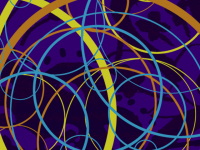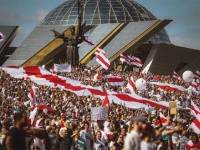Centre for European Transformation has conducted the third comprehensive study in form of monitoring of the implementation of the UNESCO Convention on the Protection and Promotion of the Diversity of Cultural Expressions by the Republic of Belarus.
Gintautas Mažeikis’s video report: “Political sphere and arena ratio in light of information wars and propaganda”

In his report, philosopher Gintautas Mažeikis discusses several concepts that have been a part of the European social and philosophical thought for quite a time.
Having started with simple concepts of a “political sphere” as a “sphere of tension of public interests” and “political arena” as a main scene, manifestation, and collisions of these interests, professor Mažeikis briefly mentioned the historical process of “sovereignties’ erosion”. This process is related not only to the delegation of some state’s authorities to super-state institutions, but also with the “penetrability” of political spheres caused by the appearance of transnational corporations and development of communication technologies. Thus, now the boundaries of a political sphere and the boundaries of the state almost never coincide, which makes us change the evaluation system and appraise the “size” of the country differently — not by the number of people and territory.
A political sphere depends on many variables, among which are conflicts and actions at the “arenas”. But since the boundaries of the political field ceased to coincide with the boundaries of the countries, it is quite logical that the “arenas”, communicative practices, and propaganda techniques might also be brought out of these boundaries. All that is a serious challenge not only to the state, but also to the international legal mechanisms.
A parallel and no less important process is the appearance and quick spreading of such phenomenon of public life as “scene” — a certain state of society, a different mechanism of social and political reality generation. Informational reality of the modern society suggests that “scenes” have gradually forced out “arenas”; from now on representations shouldn’t somehow correlate outside the virtual space and well-designed “scenes”. The whole class of political techniques became possible and efficient at the expense of society’s spectaclization.
Having launched the process of constant virtual delivery of “gore fest” in the modern society, the spectacle directors got caught in their own trap. The consumer society has its own inertia; it doesn’t consume everything it can. It has its own consumption skills; so it’s quite hard to shape the demand for this or that type of product. Besides, the habit to consume certain images lessens the audience’s ability to imagination; it stops understanding other phenomena but for those that it got used to. Thus, puppeteers start depending on the “society of the spectacle” market.
Not only the “society of the spectacle” gradually becomes capable of “self-reproduction” and “self-spectaclization”; consumption makes people euphoric, while modern technologies that are available for consumers allow them to reproduce the “spectacle” independently, regardless of huge corporations and regardless of political consultants, who strive to rule the world through the organization of different “scenes”. And the only way-out for the new “Messiahs”, who are trying “to awake the society from sleep”, is to return the arena, a real, not virtual action. However, when society is driven to such a state, arenas return in a very brutal way. Civilization skills and abilities to stimulate the society are lost; real blood and terror are used instead.
“And the problem lies not only in restoring the arenas and keeping a balance between manifestations and representations, between a political action and a spectacle, but also in making this return more or less civilized”, — claims philosopher and professor of Vytautas Magnus University (Kaunas) Gintautas Mažeikis in the end of his report.
[Please don't forget to turn the captions on for English subtitles!]
You can watch the full video report in Russian here.
Others
-
Civil society in Belarus 2015-2021: from stable development to new challenges
We present a collection of articles “Civil society in Belarus 2015-2021: from stable development to new challenges”.
-
The Belarusian Civil Society: dynamics of change in an unfriendly environment
We present a Discussion paper of dynamics of changes in the Belarusian civil society in 2015-2017.
-
Belarusan human rights defenders’ view on human rights activity and questions of cooperation between Belarusan human rights organizations
We present a research results report of Belarusan human rights organizations sector.
-
Social base of transformation programs in Belarus
We present a sociological research report (abridged version) of social base of transformation programs in Belarus.








Comments
Andrei Yahorau — Al Jazeera: “Lukashenko is irresponsible”
He said Belarus would likely face economic tightening not only as a result of the coronavirus pandemic but also a Russian trade oil crisis that worsened this past winter.